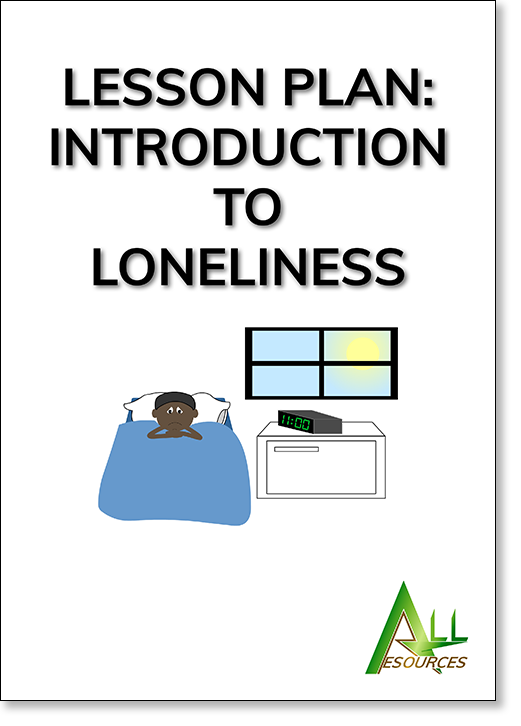Loneliness

Introduction to Loneliness
An introduction to loneliness and the way it affects our physical and mental health.
- Age range: 12 years and upwards
- Category: Lesson plan
- First published: 2022
- Pages: 15
- Duration: 55 mins – 1 hour
Hard copy: £10.99 add to basket
We all feel lonely from time to time, it is a part of life. There are times throughout the day when being on your own is unavoidable, and sometimes you may actually want to be alone. However, all humans have a need for a certain amount of social interaction and many dislike the thought of being alone. If loneliness or the fear of being alone is prolonged, it can lead to a range of mental health disorders such as anxiety or depression.
What is Loneliness?
People need people — it is part of human nature. If there is a gap between our desire for social connections and our actual experience of it, then we may be experiencing loneliness to a certain degree. Being lonely is not the same as being alone. You can be in company and yet feel lonely. You can also be physically alone but not experience feelings of loneliness at all.
True loneliness is a state of mind when you crave human contact but feel completely alone and deserted. Emotional loneliness can lead to chronic loneliness which can be devastating, leaving people feeling distressed.
What Causes Loneliness?
The causes of loneliness are varied and include the following:
- Loss of a loved one (e.g. separation & divorce).
- Loss of a significant position (loss of job, demotion at work).
- Moving to a new location/job/school.
- Low self-esteem and lack of confidence.
- Extreme shyness.
Signs of Loneliness
So what are some of the signs of loneliness?
- An inability to build meaningful and solid relationships — unable to create deep connections with others.
- A lack of close friendships, even among family members.
- Feeling abandoned even when surrounded by family and friends.
- The inability to socially engage with others despite making efforts.
- A complete sense of separation and social isolation.
What is Social Isolation?
One definition of social isolation is the absence of family, friends, relationships or other forms of social contact. This can be by choice or for other reasons. Feeling alone is not necessarily the same thing as being socially isolated. As mentioned above, you can be alone but not lonely, whereas, a lonely person can feel lonely while being around people.
Social Isolation Symptoms
Symptoms of social isolation include:
- Social withdrawal by avoiding contact with others.
- Deterioration in physical appearance and/or personal hygiene.
- Lack of interest in social activities, hobbies or other things once enjoyed.
How Social Isolation and Loneliness Effect Mental Health
The number of people living alone is on the increase. Recent studies have examined the psychological effects of living alone as well as the negative effects of social isolation. In particular, research has looked at the effects of loneliness in elderly people and the side effects of loneliness. Mental Health Awareness Week 2022 was an opportunity for people to work together to raise awareness of the impact of loneliness on our mental health.
Dealing with Loneliness
There are a number of ways to deal with loneliness as follows:
- Confide in someone you trust. Problems do not seem as difficult when they are shared. Loneliness is not unusual and there are many people feeling sad and lonely. Talking about the issue can help you pinpoint what needs to change.
- Try a new activity or hobby which will keep you occupied. Focusing on a task can help break the ice with others and you may find people who have the same interests as you.
- Do not be overly negative about others. Give them the benefit of the doubt and try to be more optimistic about people’s intentions.
- Make the first move. Don’t always wait for others to approach you — make a decision to be the first to approach others. The more you do it, the easier it becomes.
Coping with Loneliness
Coping with loneliness is a mindset — it is a way of thinking about how to be ok with being alone. It is important to remember the following:
- Try to enjoy your own company — it is good to feel comfortable in your own skin. It is not necessary to be around people all the time.
- Don’t be tempted to use social media to fill gaps in your time. If you do go online, choose positive connections or forums, not ones that make you feel bad.
- Remember your limits and don’t expect too much too soon. Focus on the things you can control, not the things you can’t.


